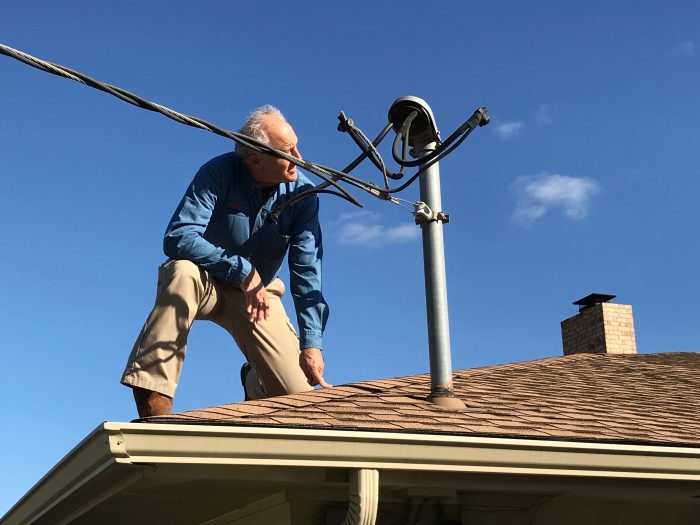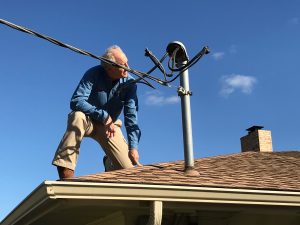
The Home Inspection; what is it?

Pete Lewiston, M.Ed.
(Note: The content of this article assumes the specific authority of the statutes and regulations of the state of Texas regarding the practice of Home Inspections. Other jurisdictions may not require the same level of regulation or limitation to the scope of a home inspection.)
The term “home inspection” is a generic reference to the real estate inspection of a property, structures and improvements, and/or systems and appliances of the residential structure. The home inspection is often used with a real estate transaction. It can also be used to provide important information for any activity involving the condition of a home, such as maintenance scheduling and budgeting, monitoring the process of construction or remodel work, or checking the home’s condition before the expiration of a new home warranty, for example.
The home inspection involves a visual inspection of the “performance” of material and mechanical functions of the home. Invasive measures are not required beyond removing normal consumer barriers such as certain mechanical control panel covers, and entering attics and foundation crawl spaces. Going beyond these barriers may also be limited by conditions that would make it dangerous or unhealthy for the inspector to proceed. Such conditions could be considered a deficiency in themselves.
Most critical to a home inspection is the identification of conditions that represent life safety concerns for the occupants, and material concerns regarding the structural and mechanical integrity of the home. Conditions found in either area can be integrally related and affect the other. A non-performing condition is referred to as a ‘deficiency.”
The person responsible for the inspection is the licensed real estate inspector. The inspector is legally and ethically bound to the single client who hired the inspector to complete the inspection and to deliver a written report of the findings of the inspection. The client is strongly encouraged to attend the entire inspection, or at least be available toward the end of the inspection to discuss with the inspector the findings and personally view items of deficiency.
Generally the inspection of an average size home can be expected to require 2 to 4 hours depending on the size, age, type of foundation, and physical conditions present in the home. A complete inspection relies on available access to the areas and items to be inspected. It is the client’s responsibility to confirm with the current homeowner that access to all areas and items are available at the time of inspection.
The following information explains these concepts further, or call 469 612-5440 with questions, and order the Home Inspection here.
Inspection Process
The need for an inspection is specific to the client’s purposes.
A homeowner contemplating the listing and sale of their home may benefit by identifying the existing condition of the structural and component parts of the home. Any deficient item can and will be identified if and when the buyer has their own inspection performed prior to purchasing the house. Although the homeowner will be required to disclose any deficient item that was found in their own inspection, the preparation for sale by the owner of repairing the item, or determining a reasonable discount off the asking price may go a long way to instill confidence for the buyer to proceed with the purchase. The seller can also proceed with confidence knowing the chance of further unforeseen physical problems affecting the sale is virtually eliminated.
The prospective home buyer is always encouraged to obtain an inspection for their intended house purchase. Obtaining the services of a professional who is knowledgeable, experienced, and trained to look for and identify deficiencies is vital to helping the buyer know what they’re purchasing. The buyer’s realtor will be able to advise their client regarding those deficient items that should be negotiated for repair, discounted by the seller, or those items which are negligible to the value of the home. The home inspection is also invaluable for advising the client regarding proper maintenance of their new home; items specific to the home that should be monitored for proper performance; and components that the new homeowner might anticipate and budget for replacement in light of current age or condition.
Current homeowners may find it helpful to obtain periodic inspections to stay on top of their home’s condition. The home inspector not only identifies existing deficiencies, but conditions that can lead to serious material and mechanical deficiencies. Correction of substandard conditions now at relatively low cost may prevent the development of serious problems that would be much more costly to correct, not to mention the identification of conditions that could lead to a possible life safety threat to inhabitants.
The consumer who has a home under construction is able to monitor the construction process using phase inspections. Typically phase inspections are most beneficial at three periods of construction; prior to placement of the foundation, prior to the installation of drywall, and at substantial completion of the residence. The phase inspection process not only provides a pair of professional eyes to the consumer during construction, the inspector can advise regarding best practices in the construction process, educate the consumer about effective home maintenance of their new home, and help document aspects of the structure that will be concealed by the finished product. Information collected during the construction process may be beneficial for future deliberations regarding the home, such as new home warranty claims.
Other beneficial uses of home inspections include structural inspections when performance problems are suspected; pre and post lease contract/expiration; pre and post remodel work and retrofit construction; loan progress draws; home warranty inspection last month of expiration; and any situation where the condition and performance of a residential structure needs to be determined.
The Inspector
The licensed professional real estate inspector will be the most qualified provider of a comprehensive inspection, and the resulting written report of identified deficiencies is the only authoritative document available for the negotiation of a real estate transaction regarding the general condition of the property.
Any qualified inspector is capable of providing competent inspection findings and professional documentation. With that said, inspectors like all humans are not perfect, or robotic. Individual inspectors must use all of their senses, be able (and willing) to adequately maneuver in and on various physical spaces, and possess the personal knowledge and experience that enhances the ability to identify deficient conditions.
Although professional qualification will be equal among professional inspectors of a particular regulatory jurisdiction, individual experience levels will not be. The inspector must find the deficient item (if there is one) in a “haystack” of various materials, structural configurations, wires and piping serving different purposes and capacities, and systems and appliances each with their own purpose and mechanical requirements, all evaluated within an average inspection visit of 2 to 4 hours. Given such parameters it follows that the more practical experience an individual possesses the better prepared to assess and identify indicators quickly and efficiently, maximizing the identification of potential deficiencies. Note that multi-inspector inspection companies are likely to have in their employ apprentices and recently trained inspectors from various (and possibly non-construction related) career backgrounds. The client may want to verify with the inspection company the prior experience of the inspector assigned if that is of importance to the client.
The inspection client can be confident in hiring any licensed professional real estate inspector, especially when the need is immediate and time sensitive such as a buyer (pre-purchase) inspection. Local real estate offices or agents are a ready source of recommendation for established inspectors. The discerning consumer, however, may have more time and interest to research inspectors for knowledge base and practical experience. Certain inspectors may list documented personal experience in their website and promotional material. And, for clients with specific needs requiring special technical knowledge or instrument driven data, qualified inspectors can usually be found with the specific qualification and ability.
Obtaining the Inspection
Home inspection services are readily attainable. The purpose for the inspection may dictate the source of where to look for an inspector. As with all competitive business, self-promotion is keen among individual inspectors working to build their brand and business. Promotions may include free specialty inspection items and techniques, point of sale perks like recall checks on appliances, free (temporary) home warranties, and even guaranteed (conditional) promise to buy the client’s home if not satisfied. Whether or not such inducements are important to the client it remains that the fundamental value of a home inspection is the competent and thorough assessment of the condition of the property.
An impartial source of referrals may include friends and family who have been pleased with certain inspectors in their own transactions, and local real estate offices and agents, starting with the buyer’s or listing agent (real estate professionals are ethically bound to impartiality, and to provide information and recommendations that are in the fiduciary interest of their client). The internet also is an impartial and informative source when focusing on search criteria such as
- Locality
- Knowledge and experience, or
- Specialties, such as
- Structural and Foundation,
- Energy Use, and
- Air Quality
Timeliness may be crucial during pre-purchase option periods. Some individual inspector websites may offer instant, 24/7 capability to order an inspection online. In a crunch situation this may eliminate the effort and stress for the client having to call around to find an inspector and arrange the inspection. Submitting the order requires no obligation and alerts the inspector to the basic information necessary for the inspector to complete the scheduling and transaction with the client.
Inspection Items
Inspection items include (minimally)
- Structural members and materials from the foundation to the roof including doors and windows, thermal envelope, and structural ventilation
- Electrical system from the utility service drop to the plugs and switches in each room, and ground bonding
- Heating, Ventilation, and Air Conditioning (HVAC) equipment and delivery system
- Plumbing system from the utility water meter to supply system; drains, waste, and vents (DWV); and gas supply piping and bonding
- Built-in appliances including cooking and dishwashing equipment, food waste disposal, and clothes dryer venting system
Optional items on the property may be inspected if the client chooses (sometimes at additional cost), and depending on the qualifications of the inspector, such as
- Lawn irrigation sprinkler system
- Pool and spa
- Septic system
- Water well system
- Detached buildings and structures
Certain inspectors may also offer specialized services such as thermographic imaging, energy audits, air quality, elevation surveys, wood destroying insect (WDI), mold assessment, code verification, and even flying drones for aerial visualization of the property. Qualified inspectors will often promote the availability of their specialty, although the value of it may be pertinent only to the client’s specific needs. Sometimes a specialty inspection product may be offered for free with the standard inspection to achieve an edge over competitors.
Inspection Limitations
The home inspection is an observational assessment, therefore, any structural or system components concealed in walls and other inaccessible areas of the structure are excluded from inspection.
All items to be inspected must be readily accessible to the inspector to visually inspect and/or operate normal consumer operated mechanical controls. Prior to the inspection the homeowner should
- ensure all utilities (electric, water, gas) are working and appliance pilot lights are lit
- identify the location of, and ensure clear access to attic and crawl space entry openings;
- remove any temporary objects (storage, furniture, etc.) from inhibiting access to electric panels, utility and appliance closets, etc.;
- unlock enclosures, trim vegetation, or remove temporary objects from around exterior components such as HVAC condenser unit, exterior electric and control panels, hose bibs, and utility meters;
- empty dishwasher, range/oven, sinks/lavatories, under sink cabinets, and showers/baths;
- and remove vehicles from garage.
Sharing this article with the homeowner may assist in providing for these expectations.
Deficiencies
Deficiencies are existing conditions involving the lack of performance or substandard status of a system, component, and/or structural part of the house, as well as the detrimental effects of related support and environmental factors. The deficient condition is brought to the client’s attention by the written inspection report.
By definition, a deficient item is preventing the home from performing as originally intended. The deficient item could be anything from a light that doesn’t turn on when switched (burned out bulb maybe), to an inadequate gas appliance vent that could allow deadly carbon monoxide gas to threaten the life of the inhabitants. The report does not attempt to prioritize the relative importance of one deficiency compared to another, but the information provided should indicate the nature and possible consequences of the deficiency if not obvious from its description.
Since the report is identifying the deficient item, the inspector usually feels compelled to recommend that it be corrected by a service provider sufficiently qualified to do so. Another common recommendation of inspectors is to monitor a potential condition which may not be currently deficient, but exhibits characteristics indicative of a deficient condition. This is often the case when structural evidence indicators (i.e., damage) are found but are not sufficient to determine actual structural performance deficiency at time of inspection, for example.
The presence of identified deficiencies is normal and expected with any home inspection. The client now has the information necessary to make an informed decision, hopefully in consultation with professionals (i.e., realtor, contractor, etc.), about the prospects for the home.
The Inspection Report
The inspection report is the documented product of the inspection, and along with the physical assessment work by the inspector comprises “the home inspection.” The report will list the items found to be deficient. It may also contain any amount and type of information the inspector feels is important or helpful for the client to know about the house.
Most current inspectors utilize digital technology in some or all of their inspection activities. Technology provides for enhanced documentation and presentation of findings, such as high quality photographs and other helpful graphics and diagrams to enlighten the client’s understanding. It also reduces much of the manual task of creating the printed document. In fact, when the client is equipped with the same common technology there’s no need for printing at all.
Just as important as expediting and completing the inspection in a timely manner, the report should be concise and easily understood to be useful to the client and those assisting them to complete the real estate transaction. Most digital report programs will automatically produce a summary outline of inspection findings providing a useful brief of information for negotiations, and to guide service providers in correcting deficiencies.
Summary
The home inspection has become commonplace throughout the U.S. in relatively recent history and it has grown to be an increasingly organized and regulated industry. Even so, some states and municipal jurisdictions still exercise no formal controls over the activity, while others have developed very structured and regulated requirements regarding the process and those who practice inspections.
The growth of the industry underscores the necessity and wisdom of verifying the condition of a residential structure. Our increasingly efficient building systems and components may have lulled some into ignoring important maintenance practices, leading to improperly functioning houses. The do-it-yourself (DIY) philosophy and its commercial exploitation may also have contributed to a plethora of substandard and improper installations and material applications as novice consumers attempt all types of repair and renovation.
Real estate inspection services provide a ready resource for prospective and current homeowners to verify the condition of a home with confidence when buying, selling, or for continuing maintenance. Order the Home Inspection here.
Pete Lewiston is a licensed professional real estate inspector (TREC Lic. 22679) serving the Dallas/Fort Worth metroplex. His business website at HeadsUpHome.com is a complete source for inspection information and services, and he is available to answer questions by email at pete@headsuphome.com or by phone at 469-612-5440.
